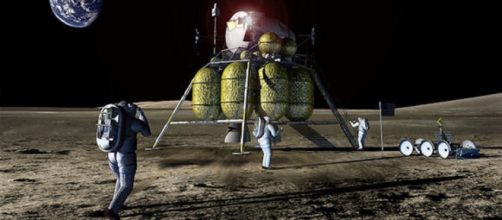Sen. Ted Cruz, R-Texas convened a hearing of the Senate Subcommittee on Space, Science, and Competitiveness on the subject of “NASA at a Crossroads: Reasserting American Leadership in Space Exploration.” The theme of the hearing was of the necessity to stay the course on NASA’s space exploration program, called the Journey to Mars. In his opening statement, Cruz decried the cancellation of both the space shuttle program and the Constellation space exploration program, the latter of which would have returned American astronauts to the moon by the end of the current decade.
The shuttle was scheduled for termination by President George W. Bush to help free up funds for the Constellation program. At the time, NASA anticipated that the period before the Orion spacecraft would be available, launched on the planned Ares 1 rocket, would be brief. Bush had also started the Commercial Orbital Transportation Systems program to enable a commercial sector option for cargo and eventually crewed spaceflight to and from the International Space Station. But funding shortfalls and technical challenges combined to delay the onset of the Orion/Ares 1 system.
President Barack Obama abruptly and unexpectedly canceled Constellation and doubled down on building commercial spacecraft.
The decision, which blindsided Congress and the aerospace community, remains controversial to this day. A messy compromise gave rise to the Journey to Mars program, with astronaut boots scheduled to hit the ground of the Red Planet sometime in the 2030s. Commercial Crew spacecraft will begin operations in 2018, ending a lengthy period of reliance on Russia for access to space.
Cruz is looking ahead to the change in administrations and is seeking to avoid the kind of disruptive changes in direction that Obama caused with his cancellation of Constellation. Donald Trump, the Republican candidate, has expressed skepticism about the Mars goal and suggested that it might have to take a back seat to infrastructure repair, Aside from generalities, Hillary Clinton has not expressed any opinion about NASA or space at all.
A couple of interesting tidbits came out of the hearing.
When asked about whether NASA is receiving adequate funding, witness Mary Lynne Dittmar, executive director of the Coalition for Deep Space Exploration, suggested that “modest” increases in the financing in the future would be needed to keep the Journey to Mars on track. Many analysts suggest that to build hardware such as interplanetary habitats and Mars landers, the increases would have to be substantial.
Sen. Bill Nelson, D-Florida, the ranking member of Senate Commerce Committee, decried what he considered to be politically inspired attacks on the Asteroid Redirect Mission. He seemed to be under the impression that President Obama had called for the mission to Mars just as President John F.
Kennedy announced the moon landing goal, leaving the details to NASA. However, Obama was very specific about intermediate goals for the Journey to Mars, placing the moon off limits and mandating a visit to an Earth-approaching asteroid instead.
The asteroid mission has since morphed into a scheme to use a solar electric propelled spacecraft to snag a boulder from an asteroid and place in in lunar orbit to be visited later by asteroids. The ARM has been decried by the scientific community is being a useless project of little or no scientific or engineering value.
The subject of a return to the moon, being pushed by House Republicans, did not come up during the hearings.

